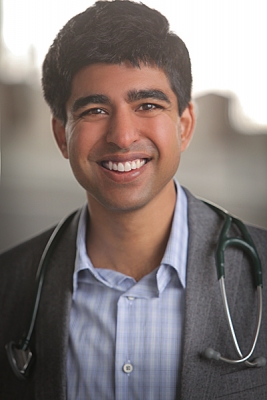When Neel Shah, MD, an OB/GYN, was a resident at Brigham and Women's Hospital in Boston, he encountered a patient who had an ectopic pregnancy — a potential medical emergency for the mother in which the embryo is not in the uterus.
 The patient asked Dr. Shah how much treatment was going to cost, and he hit a wall. He had no idea what the cost of care was. As a resident, he and many others abide by the Hippocratic Oath to first, do no harm, and always keep the patient's health and safety at the forefront. In training, he says physicians simply are not trained to think about the cost, or financial well-being, of their patients. This lack of knowledge "eroded [the patient's] trust in me," Dr. Shah said.
The patient asked Dr. Shah how much treatment was going to cost, and he hit a wall. He had no idea what the cost of care was. As a resident, he and many others abide by the Hippocratic Oath to first, do no harm, and always keep the patient's health and safety at the forefront. In training, he says physicians simply are not trained to think about the cost, or financial well-being, of their patients. This lack of knowledge "eroded [the patient's] trust in me," Dr. Shah said.
"You spend a quarter century in the classroom, and you have an idea of what being a doctor was going to be like," said Dr. Shah, 31. "But there's this huge disconnect."
Dr. Shah, and many other physicians-in-training, have been frustrated with this side of medicine. Roughly one-third of all healthcare spending, or approximately $800 billion every year, is spent on tests and treatments that do nothing to help patient care, yet the medical culture encourages this type of waste. In the process, medical bills continue to be the leading cause of personal bankruptcies in the United States. It translates into a loss for patients, healthcare organizations and society at large.
A few years ago, Dr. Shah founded Costs of Care, a nonprofit organization that aims to help clinicians and patients "deflate medical bills." He spoke and sat down for an interview at the 2013 Strata Decision Summit in Chicago on Oct. 22, saying the time is ripe for the clinical and financial houses in hospitals to come together.
"Physicians are increasingly willing to partner with financial managers, and for the sake of all of us — patients, institutions —we need to find new ways to merge our knowledge," said Dr. Shah, who is now a practicing OB/GYN at Beth Israel Deaconess Medical Center in Boston.
Physicians haven't traditionally shared a lunch table with hospital CFOs and their finance teams. The shift to value-based healthcare means the two sides will have to be on the same team, he said, and there are several ways to collaborate. For instance, hospitals must tell physicians what different procedures and treatments cost. As Dr. Shah mentioned, physicians are not trained to think of cost when diagnosing a patient — in fact, it's considered "taboo." Although prices and evidence of value-based care may not be enough to change a physician's habits, it's a good starting point, Dr. Shah said.
Finance executives and physicians can also look at evidence-based studies and administrative data to validate new behaviors. Dr. Shah used the example of Caesarean sections. C-sections, which are predominantly ordered by physicians, are the most common major surgery in healthcare — but a majority of them are not necessary. In fact, several healthcare organizations have said the United States could save $5 billion in maternity costs if C-section rates were more in line with global recommendations.
In the end, providers need to bring an "environmentalism" aspect to healthcare, Dr. Shah said. He compared today's medical residents to environmentalists of the 1960s, who drastically helped change public policy and perception toward conservation. People who litter on the street are bound to get nasty looks from bystanders, and similarly, healthcare professionals need the same kind of pressure to reign in the bloating costs of wasteful practices.
"Medical residents are climbing a learning curve, and like me, they are questioning everything," Dr. Shah said. "There's a social responsibility to wrap our heads around it."
More Articles on Finance and Physicians:
The New Do or Die in Healthcare Finance: Margin and Outcomes Management
Spectrum Health CFO Michael Freed: On a Journey to Price Transparency
Finding Common Ground: 3 Tips to Improve Relationships Between Hospital CFOs and Physicians

